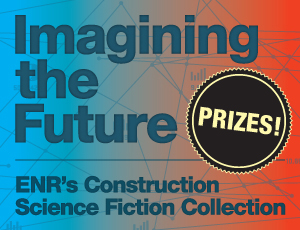
In response to requests, the deadline for submitting entries to ENR's Construction Science Fiction Contest has been extended for one week to August 7, from the original deadline of July 31. Writers, you now have until midnight, August 7, to send your stories in. Click here for the submission form.
First, second and third place cash prizes will be awarded to authors of the top three short stories submitted. As ENR Editor-in-Chief Jan Tuchman said when she announced the prizes on June 11, “We want to throw more dazzle on this project to encourage construction-industry writers to fire-up those creative engines, and what could be better for doing that than offering cash prizes?”
ENR wants contributing writers to imagine the future of construction through the lens of science fiction. We are asking our readers—who invent the future of the industry every day with their ingenuity and innovations—to help us build a collection of new, previously unpublished, short science fiction stories that gaze deep into the crystal ball of construction's future. We want stories about people living and working in the construction world of your dreams.
Winning entries, including the top three finishers, will be published in a special collection in the Nov. 4 issue of ENR. The First Prize award will be $1,000; Second Prize $750 and Third Prize $500. Submissions will be evaluated and the best selected for publication by a committee of ENR editors, with additional guest judges to be announced. Employees of ENR, or of its parent corporation, McGraw Hill Financial, will not be eligible for the cash prizes.
"We’re hearing lots of buzz about the contest and some very interesting people sending submissions. It’s clear that some of the best minds in the business are finding that the creation of science fiction about construction is a really great way to express and refine their dreams and ideas for the future of the industry,” Tuchman says.
The Project
ENR will publish the best stories in a special section in the magazine entitled Imagining Construction's Future: Engineering News-Record’s Science Fiction Collection, in the fall of 2013.
We are looking for contributions to the collection that engage the reader, demonstrate insight into the world of construction and show how new, science-based ideas could change in the future of the industry.
The project is inspired and supported by Intel Corp.'s The Tomorrow Project, and its futurist, Brian David Johnson. The Tomorrow Project hosts a wide-ranging, online conversation about life in future that uses science fiction as one of its key tools for ideas exchange.
The Tomorrow Project asks:
What kind of future do you want to live in? What future do you want to avoid?
Submissions advice: Facts and Fiction
Science fiction is different from fantasy fiction, which owes no allegiance to plausibility. Science fiction is grounded on scientifically plausible concepts. That's what gives science fiction such power not only to predict, but also to help shape the future.
Science fiction tells stories about people in future, or non-historic times, living in conditions shaped by technologies, events and environments that are different from what we think of as "normal" today—but scientifically and logically possible.
Intel’s Johnson uses what he calls "science fiction prototyping" as part of a process to create a pragmatic vision of the future of work and computing. For a practical guide to using fiction as a way to imagine our future see: “Science Fiction Prototyping – Designing the Future with Science Fiction.”
ENR's project will focus on construction, and while we expect to see some cautionary stories about futures we wish to avoid, hopefully, we also will see stories that envision how, through imagination, conditions that limit the industry today and which most of us see as immutable constraints, could actually and plausibly be eliminated tomorrow through creativity and science.
Of such ideas, inventions are made.
Please e-mail ENR-Science-Fiction@MHFI.com with questions.




